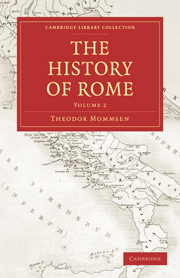Book contents
- Frontmatter
- Contents
- MAP OF ITALY
- BOOK THIRD: FROM THE UNION OF ITALY TO THE SUBJUGATION OF CARTHAGE AND OF THE GREEK STATES
- CHAPTER I CARTHAGE
- CHAPTER II THE WAR BETWEEN ROME AND CARTHAGE CONCERNING SICILY
- CHAPTER III THE EXTENSION OF ITALY TO ITS NATURAL BOUNDARIES
- CHAPTER IV HAMILCAR AND HANNIBAL
- CHAPTER V THE WAR UNDER HANNIBAL TO THE BATTLE OF CANNÆ
- CHAPTER VI THE WAR UNDER HANNIBAL FROM CANNÆ TO ZAMA
- CHAPTER VII THE WEST FROM THE PEACE OF HANNIBAL TO THE CLOSE OF THE THIRD PERIOD
- CHAPTER VIII THE EASTERN NATIONS AND THE SECOND MACEDONIAN WAR
- CHAPTER IX THE WAR WITH ANTIOCHUS OF ASIA
- CHAPTER X THE THIRD MACEDONIAN WAR
- CHAPTER XI THE GOVERNMENT AND THE GOVERNED
- CHAPTER XII THE MANAGEMENT OF LAND AND OF CAPITAL
- CHAPTER XIII FAITH AND MANNERS
- CHAPTER XIV LITERATURE AND ART
- CORRECTIONS
CHAPTER X - THE THIRD MACEDONIAN WAR
Published online by Cambridge University Press: 05 October 2010
- Frontmatter
- Contents
- MAP OF ITALY
- BOOK THIRD: FROM THE UNION OF ITALY TO THE SUBJUGATION OF CARTHAGE AND OF THE GREEK STATES
- CHAPTER I CARTHAGE
- CHAPTER II THE WAR BETWEEN ROME AND CARTHAGE CONCERNING SICILY
- CHAPTER III THE EXTENSION OF ITALY TO ITS NATURAL BOUNDARIES
- CHAPTER IV HAMILCAR AND HANNIBAL
- CHAPTER V THE WAR UNDER HANNIBAL TO THE BATTLE OF CANNÆ
- CHAPTER VI THE WAR UNDER HANNIBAL FROM CANNÆ TO ZAMA
- CHAPTER VII THE WEST FROM THE PEACE OF HANNIBAL TO THE CLOSE OF THE THIRD PERIOD
- CHAPTER VIII THE EASTERN NATIONS AND THE SECOND MACEDONIAN WAR
- CHAPTER IX THE WAR WITH ANTIOCHUS OF ASIA
- CHAPTER X THE THIRD MACEDONIAN WAR
- CHAPTER XI THE GOVERNMENT AND THE GOVERNED
- CHAPTER XII THE MANAGEMENT OF LAND AND OF CAPITAL
- CHAPTER XIII FAITH AND MANNERS
- CHAPTER XIV LITERATURE AND ART
- CORRECTIONS
Summary
Dissatisfaction of Philip with Rome
Philip of Maćedon was greatly annoyed by the treatment which he met with from the Romans after the peace with Antiochus; and the subsequent course of events was no fitted to appease his wrath. His neighbours in Greece and Thrace, mostly communities that had once trembled at the Macedonian name not less than now they trembled at the Roman, diligently sought, as was natural, to retaliate on the fallen great power for all the injuries which since the times of Philip the Second they had received at the hands of Macedon. The empty arrogance and venal anti-Macedonian patriotism of the Hellenes of this period found vent at the diets of the different confederacies, and in ceaseless complaints addressed to the Roman senate. Philip had been allowed by the Romans to retain what he had taken from the Ætolians; but in Thessaly the confederacy of the Magnetes alone had formally joined the Ætolians, while those towns which Philip had wrested from the Ætolians in two of the other Thessalian confederacies—the Thessalian in its narrower sense, and the Perrhæbian—were reclaimed by the latter on the ground that Philip had only liberated these towns, and not conquered them. The Athamanes conceived that they might request their freedom; and Eumenes demanded the maritime cities which Antiochus had possessed in Thrace proper, especially Ænus and Maronea, although in the peace with Antiochus the Thracian Chersonese alone had been expressly promised to him.
- Type
- Chapter
- Information
- The History of Rome , pp. 284 - 314Publisher: Cambridge University PressPrint publication year: 2010First published in: 1862

